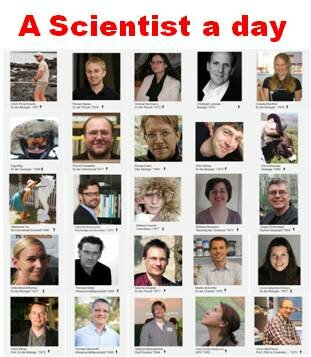Science writer and nanotechnology blogger (EN)
uli Brandt-Bohne | Aug 06, 2012 | Kommentare 0

Julian Taub studied interdisciplinary Science and Writing and is now active as Science Writer, Journalist, and a .
How did you get to Science?
Since he was young, he has always been interested in science. ` I love to learn the underlying mechanics behind everything I come across, and use that knowledge to create, whether the end result is a painting, article, or electrical circuit´, he states. Originally he went to college to study physics; he wanted to build robots for a living. `In the middle I left my major and started writing—mostly poetry and nonfiction, with a short story here and there. Eventually, I decided that I wanted to combine both my loves´, Julian explains. He graduated with a focus in both science and creative writing and started his journey as a science writer.
Where are you now and why?
`I’m still working towards the place that I want to be´, Julian starts. He has been doing freelance science writing for about two years, mostly for startup websites, but it has only been this year that he has really become a science journalist. `I tend to focus on nanotechnology´, he says and adds: ` I’m excited by the prospect of scientists coming from wildly different backgrounds and collaborating to create new, amazing materials on such a small scale´. He thinks it makes for great science stories. `Writing about it has been a tough uphill climb, but I wouldn’t exchange the experience for anything. I enjoy the challenge of exploring a new scientific field every single day´, he describes his work.
Which is your biggest scientific achievement?
Earlier this year, during the flared-up tension between the US and Iran, he obtained an interview with one of the top nanoscientists in Teheran, Dr. Abdolreza Simchi. `He is not only known in Iran´, Taub explains, `but has awards from the US, England, and Germany (his career began at Fraunhofer)´. He asked him questions about his work, sanctions, and what nanotechnology is giving back to Iranian society. By this interview Julian was able to show America and Europe a side of Iran that one doesn’t see in the news.
What is THE biggest scientific achievement?
`Since I started writing about an interdisciplinary field like nanotech, I’ve stopped looking at achievements or researchers as favorites´, Julian notes.` I see science more as a constant experiment. To me, it’s the ultimate story of human curiosity. Each perspective and breakthrough adds something more to our knowledge and how we adapt to the world around us. All of it is amazing to me—the complexity, the liveliness of scientific endeavors´.
Which scientific question would you like to be answered?
`That’s a good question. There are too many unknowns in the universe to just pick one´, Taub reflects. `However, the questions that really peak my interest are how upcoming science and tech advances will shape human interaction. Also, I would be interested to know, if we ever find life on other planets, what these alien creatures look like and how they live their lives´.
Naming discoveries
`I think if I would name anything, it would be the way science is now collaborating across cultures and disciplines to create amazing solutions to daily world problems while progressing future technology´, Julian explains. If he would name it, it would be called “Convergence,” because of the way different niche attitudes start far apart and then intersect at a certain point, for a certain event or purpose.
What should be different in Science?
`I don’t know if I can really talk about science as a whole, since it can be so vast and amorphous. Not to mention constantly evolving and self-correcting´, Julian states. To him, the scientists themselves are just as diverse. He outlines that `contrary to the stereotype of the antisocial Tesla-like scientist, the ones whom I’ve met are extremely down to earth and have a range of interesting personalities´.
Furthermore he adds: ` I guess the thing that I wish were different is if scientists had more celebrity status. Instead of People magazine running an article called `Celebrities: They’re Just Like Us´, it should be `Scientists, They’re Just Like Us!´ Then maybe there would be less budget cuts´.
How does (to you) the Science of the future look like?
`I think it looks very bright´, Julian starts, `Social media has revolutionized how scientists share data and collaborate. I see more and more projects spanning continents and cultures´. To him this is also giving the science community more of a nuanced voice. `When I browse scientists’ comments on Twitter, I always see remarks that are right on the cultural pulse´, he adds.
What was/is the biggest mistake/deficit in Science?
To Julian, even though there are many problems that arise in science, he does not think it was ever meant to be a perfect system. However, to him, the biggest deficit is how people with no science background tend to view science.` A lot of people think that science and math are unattainable knowledge and that the people who succeed in it are a special breed of human. This stereotype affects everyone negatively: the nation, the public, and the institutions. Scientists are running more and more programs to engage the public and get people excited about science, but this problem won’t go away overnight´, he sums up.
You can also participate in A Scientist a day, find more information in english here.
Du kannst auch bei A Scientist a day teilnehmen, mehr Information dazu gibt es hier.
Popularity: 4% [?]
Eingehende Suchbegriffe:
- helmholzgemeinschaft karlsruhe erdmagnetfeld
- nanotechnology scientist
- nanotechnology writing
- resumen la amígdala implicaciones funcionales
- scientic writing on nanotechnology
Ähnliche Artikel:
Kategorie: A Scientist a day • Featured
 Kommentare (0)
Kommentare (0)
Trackback URL

